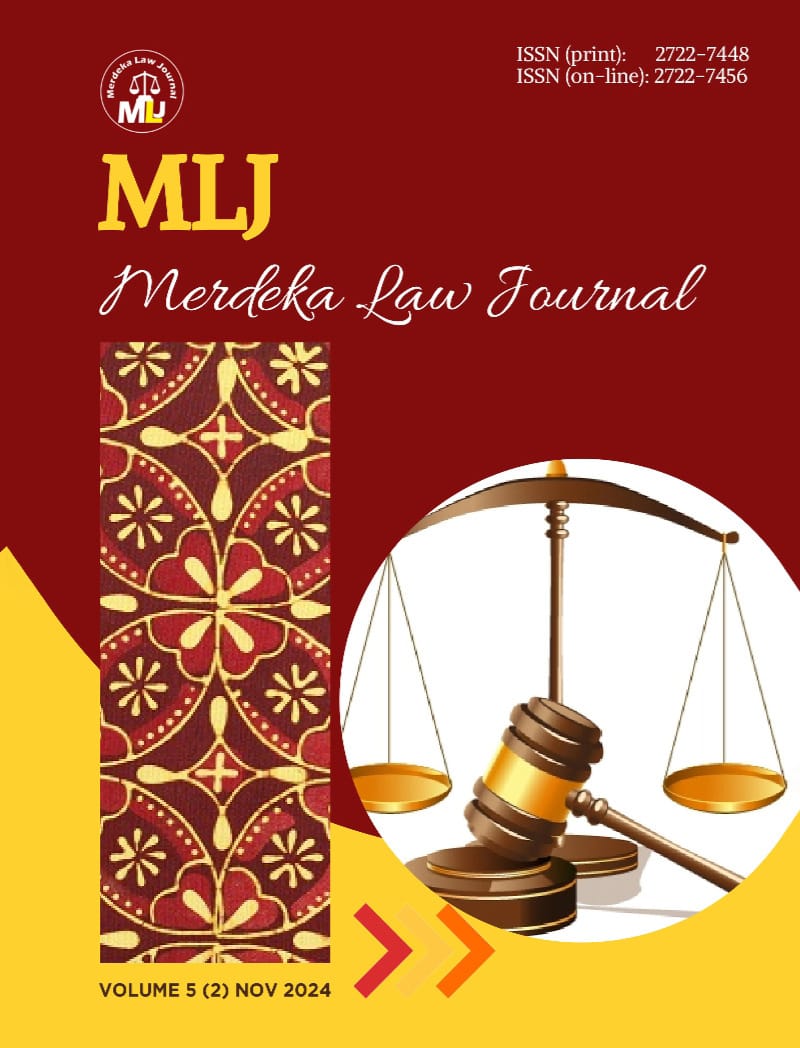Hukum Adat Sebagai Alternatif Penyelesaian Perkara Pidana Dalam Pendekatan Restorative Justice
Abstract
In the context of criminal law, the reality of the existence of customary criminal
law alongside statutory criminal law still appears difficult to accept for application
in criminal justice practice. The fundamental principle of legality is often argued
as a strong barrier to negating the existence of any criminal law other than
statutory criminal law. The research problem raised is whether customary law
can be used as an alternative for resolving criminal offenses and how the position
of customary law functions as an alternative resolution within the framework
of restorative justice in the Indonesian criminal justice system. This research
employs normative legal research methods. The study’s findings indicate that
several jurisprudences have used customary law as an alternative resolution for
criminal offenses, including PN Luwuk No. 27/Pid/1983, which adjudicated a
case of extramarital sexual relations, where the judge ruled that the defendant
violated the living law in the Banggai region, Central Sulawesi. The decision
was upheld by the Palu High Court ruling No. 6/Pid/1984 on April 9, 1984, and
later reinforced by the Supreme Court decision No. 666K/Pid/1984 on February
23, 1985. Additionally, the Supreme Court ruling No. 3898K/Pdt/1989, dated
November 19, 1992, case No. 854K/Pid/1983 dated October 30, 1984, Mataram
District Court Decision No. 051/Pid.Rin/1988 dated March 23, 1988, Supreme
Court decision No. 481 K/Pid/1986 dated August 31, 1989 from PN Ende, and
the application of customary justice in Papua Province based on Law No. 21
of 2001 in conjunction with Law No. 2 of 2021 concerning Special Autonomy
for Papua. The material position of customary criminal law has been applied
and incorporated into written regulations, particularly statutory law, as seen in
Emergency Law No. 1 of 1951. However, in a formal sense, customary criminal
law has not been regulated by a standardized set of procedural rules, and its
procedural aspects are not established in Indonesia’s positive law. It is also not
formally recognized or regulated in the Indonesian Code of Criminal Procedure
(Law No. 8 of 1981). However, a review of several Indonesian jurisprudences
reveals that customary law has been applied as an alternative resolution within
the framework of restorative justice in the Indonesian criminal justice system.
Furthermore, if we examine the customary justice system currently used in
Papua Province, as regulated in Law No. 21 of 2001 in conjunction with Law
No. 2 of 2021 on Special Autonomy for Papua, as well as the shift in criminal
punishment patterns from a retributive justice concept to restorative justice, it
becomes evident that this transition is part of the effort to revitalize the position
of customary law within the realm of the criminal justice system.
Downloads
Downloads
Published
How to Cite
Issue
Section
License

This work is licensed under a Creative Commons Attribution-ShareAlike 4.0 International License.
Authors who publish in this journal agree to the following terms: MLJ Merdeka Law Journal is licensed under Creative Commons Attribution-ShareAlike 4.0 International. Creative Commons Attribution-ShareAlike 4.0 International License (CC BY 4.0) is applied when mandated by research funders, such as those who have signed. Open Access articles in MLJ Merdeka Law Journal are published under the Creative Commons Attribution-Share Alike 4.0 International (CC BY 4.0) license. The copyright of the received article shall be assigned to the journal as the publisher of the journal. The intended copyright includes the right to publish the article in various forms (including reprints). The journal maintains the publishing rights to the published articles. Authors must agree to the copyright transfer agreement by checking the Copyright Notice column at the initial stage when submitting the article.






